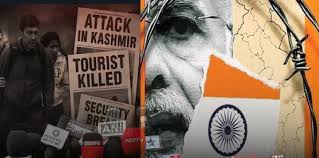
Moon Desk: To control the narrative, India has erected a wall of media censorship and disinformation. Local newspapers operate under threat. International journalists are denied access. Civil society voices are silenced under draconian laws like UAPA and PSA, which allow detention without trial for months or even years. Prominent human rights defenders have been jailed, humanitarian organizations banned, and peaceful protest criminalized. The BJP government claims “normalcy”; what exists on the ground is surveillance, fear, and silence.
Even credible Indian voices, like former Home Minister P. Chidambaram, have called out the falsehoods. His public rebuke—that there is “no evidence” linking the Pahalgam attack to Pakistan—undermines the very core of New Delhi’s manufactured justification for its militarized crackdown.
India’s legislative arsenal is now fully weaponized against dissent. AFSPA, NSA, UAPA, and FCRA have been systematically used to detain journalists, students, lawyers, and peaceful demonstrators. According to a recent report, 1012 civilians—many of them young boys—have been killed since August 2019 under the pretext of counterterrorism 2,471 were tortured and critically injured by Indian forces 28,516 civilian were arrested, 1,163 structures were burnt or destroyed, 75 women were widowed, 205 children orphaned and 136 women were gang-raped or molested.
These figures are not mere statistics. They represent a trauma that runs deep through Kashmiri society—widowed women, orphaned children, razed homes, and a public that lives in constant dread of arrest, harassment, or worse.
The Indian government’s attempts to portray Kashmir as a success story—of highways, tourism, and peace—fall flat in the face of these grave realities. And yet, global powers remain largely silent, caught in the web of realpolitik and economic opportunism.
The UN Human Rights Committee, however, recently exposed India’s duplicity. In July 2024, it questioned how anti-terror laws such as AFSPA and UAPA could possibly align with the International Covenant on Civil and Political Rights. The Committee rightly flagged extrajudicial killings, arbitrary detention, censorship, and the failure to prosecute security forces as systemic failures of a democracy in name only.
The time for platitudes has passed. Kashmir is not a local issue—it is a global concern. The forced assimilation, demographic engineering, and institutionalized violence constitute a dangerous precedent for international law and human rights norms.
The international community—including the United States, United Kingdom, European Union, Russia, and China—must hold India accountable. This means demanding a repeal of draconian laws, restoring statehood to Jammu and Kashmir, and ensuring the right to self-determination, as enshrined in UN Security Council resolutions.
Today, Kashmiris are not just resisting occupation—they are resisting erasure. What they seek is not sympathy but solidarity. Not pity but principled support. India’s obsession with optics—masked as “normalcy”—has only added to the anguish. Behind the glossy facade of development lies a region scarred by state repression, media censorship, and human rights violations. If peace is ever to bloom in the shadow of the Himalayas, it must begin with truth, justice, and the restoration of dignity to a people who have suffered for too long. It is high time that the world stops trying to please everyone—and starts holding states accountable for breaking the law.





